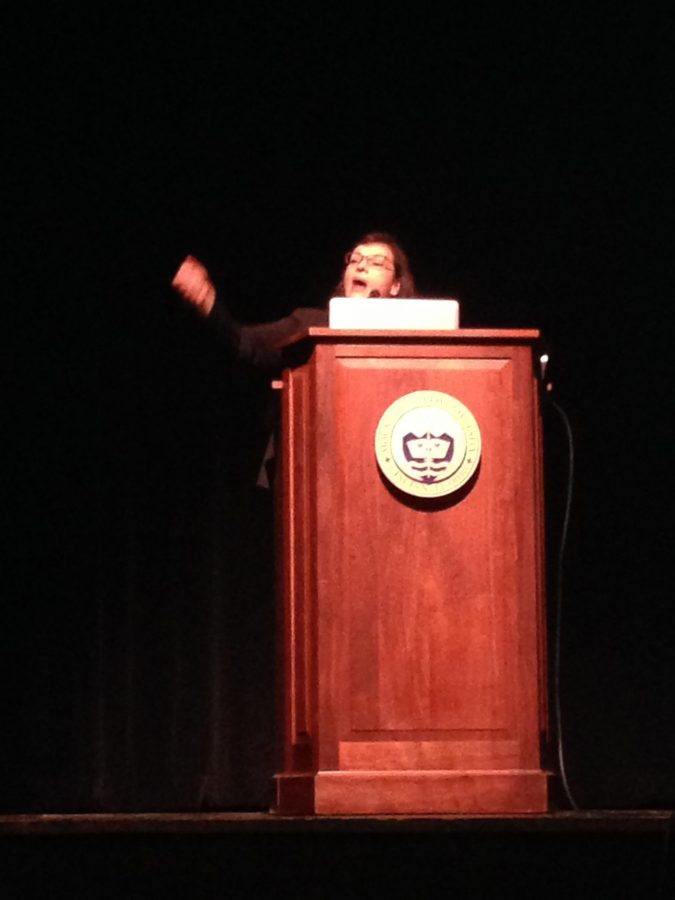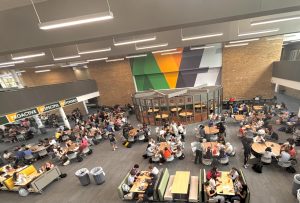Conquering ‘La Bestia’
SHS Spanish students listen, meet Pulitzer Prize winner discuss immigration
Author Sonia Nazario gives a lecture on her book and immigration on Tues. Nov. 3 at Mt. St. Joseph University. Freshmen at the university read the book in English, over the summer and they brought Nazario to their campus. Nazario’s book, “Enrique’s Journey,” won the most prestigious journalism award in the Pulitzer Prize. Photo credit: Ms. Meredith Blackmore.
November 14, 2015
You are riding on the tops of trains through Mexico to get to the United States, fighting off gangs, bandits, rapists, falling off the train, hunger, weather and corrupt police.
And if that were not bad enough, if you get to America, after the extremely treacherous journey, you are greeted by a constant fear of the police trying to deport you, and life in America may not be as easy as you were told.
The worst part: the reason you leave and risk your life getting to a country illegally is because you are leaving countries like Honduras, Mexico, Guatemala, and Nicaragua that are in terrible conditions economically, socially and politically.
Oh, and you are a child.
This is just the horrific journey that hundreds of thousands of kids and adults take every year and that Pulitzer Prize winner Sonia Nazario highlighted in her book that gave her the award, “Enrique’s Journey.”
AP Spanish and Contemporary Hispanic Studies(CHS) students read parts of her book–in Spanish–over the summer and throughout the school year. The book is the story of Enrique, whose mother left for America, and his nine attempts to get to the US to eventually find his mom.
While the book opened students’ eyes to the immigration debate, on Tues. Nov. 3, students from both classes went to Mt. St. Joseph University to hear Nazario speak on the issue she is passionate about.
Junior Noah Darwiche said, “The whole thing was great. I thought Sonia was an excellent speaker. She was very informative and passionate about the topic,[of immigration] which was seen through her lecture. I was moved by her speech; I think that it is a really important issue that people are not aware of.”
The Pulitzer Prize winner spoke of why she was inspired to write the book, her traumatic time on top of “La Bestia”–what immigrants call the train–and the inconsistencies of the U.S. government in solving the issue of immigration.
Spanish teacher Mrs. Lisa Vanags said, “How do I explain what an honor it was to meet a personal hero of mine. For me, reading this novel has been a life- changing experience for me. It really opened my eyes to the immigration crises in Central America and inspired me to help Bayron.”
Bayron is the boy that Vanags’ classes have sponsored through the Children International Organization, which supports children and families in extreme poverty in third world countries across the world.
Her classes donate money to support Bayron for him to go to school, send him gifts and write him letters. He is from Honduras and is in a similar situation to Enrique.
Spanish teacher Ms. Meredith Blackmore’s class is also sponsoring a child named Adi from Guatemala through the Cincinnati-based non-profit organization The Cooperative for Education. This group focuses on giving education to children in Guatemala, which will open many doors for them.
Senior Bedika Pathak said, “I think it was very interesting, and it would be great for her to come to SHS. The more people who know and the more she is advocating this important topic to, the more we know how to help and can start helping.”
During Nazario’s lecture, her main point was to advocate for the helpless and shed light on an issue that global citizens can help with, as the Spanish classes are doing here, right now.
Both Blackmore and Vanags were so moved that they are looking for her to come to SHS.
Blackmore said, “Since it was such a good presentation, I have talked with her[Nazario] to come speak in September 2016. My plan is to have it open to upperclassmen, Spanish classes, and AP Spanish classes from across Cincinnati.”
This plan is in the process, therefore everything is tentative, but both teachers are hopeful that she will come to enlighten students here.
Blackmore said, “A Pulitzer Prize talking at our school is incredible, and it would be incredible to host her. We would need to have fundraising activities to have her come, so be on the lookout.”
While immigration may only be a topic covered in history and global language classes, this is an issue affecting hundreds of millions, not just in North and Central America but worldwide, and Nazario is displaying how much there is to be done.







